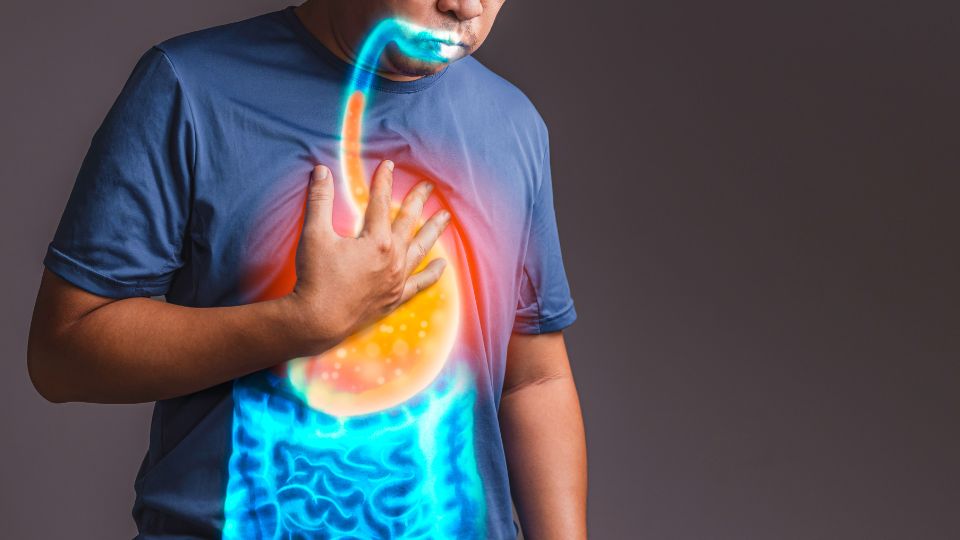Acid reflux can catch you off guard — one minute you’re enjoying a meal, and the next, you’re dealing with a burning chest, sour taste, or uncomfortable bloating. For many people, it’s a passing annoyance. But when symptoms linger or keep coming back, it’s natural to wonder if acid reflux will go away on its own. The good news? In some cases, yes — but not always. Let’s look at when you might need treatment.
What Is Acid Reflux?
Acid reflux happens when stomach acid flows back up into the oesophagus, irritating the lining and causing uncomfortable symptoms. It’s incredibly common and can affect people of all ages.
You might experience:
- — Heartburn – a burning feeling in the chest, especially after eating
- — Sour taste – acid rising into the mouth or throat
- — Bloating – feeling overly full or gassy after meals
- — Hiccups or a persistent cough
- — Nausea or slight vomiting
While occasional acid reflux is normal, frequent or long-lasting symptoms could point to a more persistent issue like gastro-oesophageal reflux disease (GORD). If symptoms become regular, it’s best not to ignore them.
What Causes Acid Reflux in the First Place?
Acid reflux doesn’t just happen out of nowhere — there’s usually a trigger behind it. Certain foods, habits, or health conditions can cause the valve between the stomach and oesophagus to relax, allowing acid to escape. Once you identify the cause, it’s much easier to manage.
Common triggers include:
- — Spicy or fatty meals
- — Alcohol, coffee, or fizzy drinks
- — Eating large portions in one sitting
- — Lying down shortly after a meal
- — Smoking or exposure to second-hand smoke
- — High stress or anxiety levels
Some medications — including anti-inflammatories and certain blood pressure tablets — can also make symptoms worse. Being aware of your own personal triggers is key to preventing flare-ups.

How Long Will Acid Reflux Last?
This depends on the cause, how often it happens, and how well it’s managed. Some people only get symptoms now and again, while others find reflux sticks around and affects daily life.
Here’s what to expect:
- — One-off episodes usually settle within a few hours
- — Symptoms that last for days may be due to repeated triggers
- — Chronic reflux (often linked to GORD) can continue for weeks or longer if untreated
If your symptoms go on for more than a few days, or keep coming back regularly, it’s worth speaking to a healthcare professional. Untreated acid reflux can lead to long-term damage, so it’s better not to leave it too long.
How to Relieve Acid Reflux Sooner
The good news is that mild to moderate acid reflux often improves with a few simple changes. If your symptoms are flaring up, these tips may help you feel better faster:
- — Eat smaller meals and avoid overeating
- — Cut back on spicy, greasy, or acidic foods
- — Stay upright for at least two hours after eating
- — Raise the head of your bed to stop acid rising at night
- — Avoid eating late in the evening
- — Sip water or herbal teas to soothe the throat
If lifestyle changes don’t help, over-the-counter or prescription treatments may be needed. Antacids, H2 blockers, or proton pump inhibitors (PPIs) like omeprazole can all help reduce acid production and relieve discomfort.

Need Support? Chemist69 Can Help
If your acid reflux keeps coming back or starts to interfere with your day-to-day life, it’s time to get help. At Chemist69, we offer prescription acid reflux treatments and friendly, expert advice — all from the comfort of your home.
With our quick and discreet online service, you can:
- — Order effective medication online
- — Get guidance from licensed UK prescribers
- — Receive fast, discreet delivery to your door
Whether you’re looking for relief or just some reassurance, we’re here to help. Contact us today or book a free online consultation to get started.


